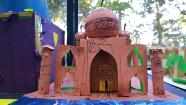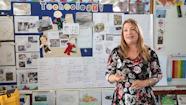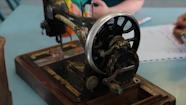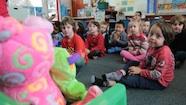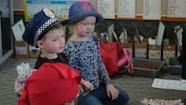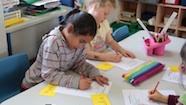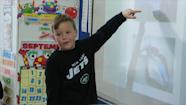Moira Patterson and Naomi Laycock show the importance of engaging students in hands-on experiences.
- Home ›
- Videos ›
- Exploring curriculum understandings beyond practice ›
- Technological experiences at Motat
Technological experiences at Motat
Duration: 03:06
Transcript
Moira Patterson: Links to the community is a really important aspect of technology education. Just as in the classroom we want children to undertake real authentic practice.
We also want them to go into the community and see real authentic practice. So you could take some children down the road to see a house being built, and see how that actually happens, stage by stage. You could equally go to Tip Top if you were doing a food unit and see how ice creams are made and manufactured. Or the zoo, the zoo is a great example because you could see the different cages and how they're designed for different animals and so on. And also museums are really a good place to go and visit, probably more so to see artefacts that have been developed in the past and to have a look at those, and it’s quite nice at Green Bay school they’re actually going to Motat because they are looking at world war one artefacts, so, that’s a lovely example of something that you can do with children and expand their understandings of technological practice in the real world.
Naomi Laycock: For term three our focus was on world war one and the technology focus was characteristics of technology and how things have changed through time. So we chose to come to Motat as part of that because they had a whole programme that was based around the characteristics of technology and world war one, very conveniently.
So we came for a visit here and just investigated lots of different technologies that were around in world war one. Looking at the kinds of technology that was around, whether it’s still around today, and how it might have changed or modified. Also looking at what some of the issues were around world war one that caused the technology to be created and invented in the first place. Then we took that, those ideas that we gained here back to the classroom and the children selected which kind of technology that they wanted to investigate further. So we ended up with eight different projects going on in the classroom, around morse code, field phones, pigeon post and the morse code using lightboxes as well.
So the children all had their own little projects going and became inventors themselves, and one group invented their own version of the field phone, sending morse code through cups and string, and investigating Samuel Morse and some of that stuff. So they’ve been super engaged and really focused, and the knowledge that they’ve gained has been amazing.
We chose to come to Motat because as a teacher it would be really hard to find enough resources to pull together some hands on experiences for the children, I believe hands-on experiences are really important for them and I don’t think I would have been able to resource that myself as a teacher.
Related videos
-
Building technology inquiries in years 1–6 (02:47)
Shannon Maloney talks about building rich technology units within a programme of inquiry in years 1–6.
-
My role as a lead teacher technology at Green Bay Primary (02:48)
Diana Comp shares about providing resourcing, inspiration, and professional learning in her role as lead teacher technology.
-
Hooking primary students into technology (02:34)
Diana Comp shares some of her strategies for engaging primary students and growing understandings in technology.
-
A principal supports technology local curriculum implementation at primary (03:02)
Jude Black describes how her sabbatical changed her thinking and leadership style and inspired her to share her knowledge....
-
New entrants identify the made world (03:14)
New entrants explore what technology is with teacher Jill Harper.
-
Year 1–2 technologists design for a purpose (03:52)
Students in years 1 and 2 discuss with their teacher why technologists make things out of different materials.
-
Year 1–2 future technologists (02:06)
Kathy Chandler and her year 1–2 students discuss technological outcomes and what technologists do.
-
Cars are technological outcomes (03:53)
James Mawson explores cars as technological outcomes with his year 2 class.
Building technology inquiries in years 1–6 (02:47)
Shannon Maloney talks about building rich technology units within a programme of inquiry in years 1–6.
My role as a lead teacher technology at Green Bay Primary (02:48)
Diana Comp shares about providing resourcing, inspiration, and professional learning in her role as lead teacher technology.
Hooking primary students into technology (02:34)
Diana Comp shares some of her strategies for engaging primary students and growing understandings in technology.
A principal supports technology local curriculum implementation at primary (03:02)
Jude Black describes how her sabbatical changed her thinking and leadership style and inspired her to share her knowledge....
New entrants identify the made world (03:14)
New entrants explore what technology is with teacher Jill Harper.
Year 1–2 technologists design for a purpose (03:52)
Students in years 1 and 2 discuss with their teacher why technologists make things out of different materials.
Year 1–2 future technologists (02:06)
Kathy Chandler and her year 1–2 students discuss technological outcomes and what technologists do.
Cars are technological outcomes (03:53)
James Mawson explores cars as technological outcomes with his year 2 class.

